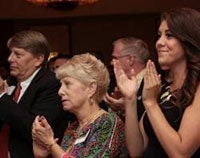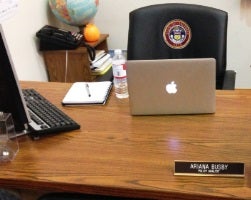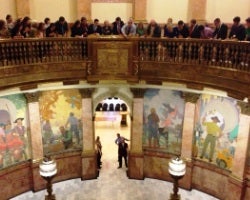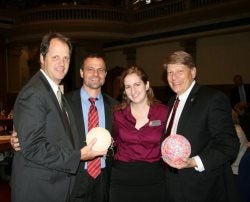
Busby at the El Paso Lincoln Day dinner with Sen. Scheffel.
Ariana Busby is still a student, a Political Science Senior with a Law Studies minor, but when she graduates in December she already has a job lined up. It won't be just a "day-job" to pay the bills, but the kind of job that could put her on the road to success in politics. As Policy Director in the Senate Minority Office, Busby will be putting to work the knowledge and connections she gained this past spring working as an intern at the Capitol, an internship she got as a part of the CU in the Capitol program, offered by the Department of Political Science.
"As an intern at the Capitol, I got the opportunity to learn about state politics from all angles. I learned administrative and communication skills while answering constituent emails and calls. I acted as a first point of contact for lobbyists and constituents visiting the minority office and my assigned senator, Senator Baumgardner," remembers Busby. "I gained a more thorough grasp of legislation by observing floor work, attending committees, and completing legislative research requests. I also got to explore the more social side of politics at legislative events and fundraisers."
The most valuable part of the internship for Busby was the ability to learn through immersion. Busby signed up for the CU in the Capitol program just after declaring her political science major, and was still green in the ways of state politics. Having faced a steep learning curve going in, she says, "There really is no better place to learn about politics than within the Capitol."

Busby's desk her first day at the capitol.
The CU in the Capitol program started in 1995, and to date roughly 200 students have gained access to the inner workings of the government through the program. Tied to a regularly scheduled political science course in Colorado Politics, students who sign up are required to complete an internship within the Colorado General Assembly with a Senator, Representative, Governor's office, lobbyist group, media organization, or other agency. Though students meet regularly for seminar discussions, the bulk of class time happens in the field, at these internships, which must run from 8–12 hours a week. The syllabus for the class cautions students to take the internship seriously, and advises:
"In your field work, you will have a chance to see first-hand how politics in Colorado operates, who holds the power in the state, what the major issues are, how bills are passed, what the role of the citizenry is, and a good deal more. You will also have a chance to meet some of the movers and shakers in Colorado, to network with your peers about government operations and opportunities, to develop valuable job experience, to explore possible career paths, and possibly even to move directly into paid work. Past class members have moved on to paid positions as the bill recorder in the House, legislative aides and policy analysts, press secretaries, Washington D.C. staffers, and paid political directors and campaign managers. Some class members have been tapped by their party or by other officials to run for legislative office. Several students have turned their initial fieldwork in this class into the basis for an honors thesis in our department."
Tony Robinson, Associate Professor and Chair of the Department of Political Science, looks forward to the CU in the Capitol program each spring. He describes himself as the facilitator of the program, rather than the traditional "teacher," of a course, and says most of what students learn over the course of the semester they learn in the Assembly and from each other. He emphasizes to students that this is an experiential and participatory course where students produce knowledge by their engagement, and by teaching each other through discussion of experiences, rather than by digestion of materials he provides. Busby says that Professor Robinson greatly furthered the educational experience she was getting in the halls of the capitol with biweekly class discussions, "where I got to hear the perspectives of students working for other offices and the opposite political party."
Robinson says, "Students have a pressing desire for the kind of professional education and career development they receive in an experience like this. In addition, there are few better ways to develop and apply classroom learning than by directly engaging politics as students do in this program."

Interns attend the 2013 End of Session Ball Drop.
"I interned in 2013, which was a very controversial year in the State Legislature," remembers Busby. "The class was the perfect format because it forced me to look beyond the party line and helped provide depth to my beliefs." This moral fortitude came in handy for Busby, who was recruited to Washington, D.C. and an internship in the United States Senate as a result of the program. Busby says of the combined experiences, "Interning is crucial. There is so much about the political system that you can't learn in a textbook. What I love about politics is that, because it influences everything, there is something for everyone. I'd encourage exploring internships on different levels of government and within the various think tanks."
As Busby steps into her new role as Policy Director in the Senate Minority Office, she is taking over the position from another alum of the CU in the Capitol Program, Athena Dalton. Dalton graduated in 2010 with a degree in Political Science and a minor in Economics, and left Colorado just this fall to pursue her dream of graduating law school, at Northwestern University. Dalton remembers her time in the CU at the Capitol program fondly, "Working at the capitol was an all-around fantastic experience. I especially appreciated the opportunity to meet so many influential and interesting people in Colorado politics. These contacts came in very handy in future job searches, and several have become close friends."
In her internship working as a legislative aide to a state senator, Dalton says she got to meet people working in all aspects of government and, "This exposure to a broad range of career paths allowed me to narrow my focus to what I really enjoyed and was good at—policy. Within a year I was offered an entry level job on the policy team in the House of Representatives, and continued working in that vein to become a policy director in the Senate a couple of years later."
"Even if the campaign you work on isn't successful, or the legislator you intern for retires, you will meet people during your internship who can recommend you to employers when job openings crop up—assuming that your work was excellent, of course," Dalton says with the confidence of one who knows.

Dalton (center) with Sens. Cadman (left), Mitchell (left-center), and Scheffel (right)
Jacquelyn Lawrence plans to graduate in spring, with a dual major in Economics and Political Science. She interned for a state senator this past spring, and says the experience exposed her to a world of new opportunities, because every day was different. From assisting the senator in doing research for bills or constituent relations, to attending luncheons or meetings on the senator's behalf, Lawrence says her duties covered whatever the senator or his aide needed. "There were a lot of positive aspects to this experience. Given that I would like to pursue a career in politics, probably the most valuable aspect was the networking. I met so many people who are involved in Colorado politics," she says.
Lawrence's experiences working for a senator have also helped her hone her career focus. Prior to this spring, Lawrence says she knew she wanted to be involved with politics, but wasn't sure in what capacity. CU at the Capitol gave Lawrence the chance to see what life was like from a lot of different political angles, having worked with lobbyists, the senators and their staffs, and the legislative staff members. After gaining all these perspectives Lawrence has distilled her advice for other students interested in politics down to one direct statement: "Get involved. Now. Politics is so much about building on experiences and relationships. It's a lot easier to be successful when you understand how all of the various parts of politics fit together."
Dalton agrees, and stresses, "Start working, volunteering, or interning somewhere now! Politics is very much a word-of-mouth business. The best way to land a job upon graduation is to get a reputation as a great intern, aide, or volunteer. It's common for unpaid interns to be offered paid positions when a vacancy opens up, so find a place you'd like to work someday, convince them to let you volunteer there, and become indispensable."
In the end, students learn character through the "ask not what your internship can do for you, but what you can do for your internship" mindset of the CU in the Capitol program. Professor Tony Robinson emphasizes to students that the legislators and others they intern with are doing vital public work, often for little pay, and that they are doing students a great honor and service by putting their confidence (and that of the public) into these interns. Robinson's syllabus reminds students, "This term, you will be part of the process of Colorado government; to a small degree what you do or don't do will affect the quality of our local democracy. So take it seriously and try to leave the legislature and the State better off than it was when you entered its power structure."
